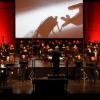
A land is stricken by a plague. Its suffering citizens implore their leader to save them and their country. Their charismatic and famous head of state promises rescue, not knowing what the cost to him and his family will be.
This sounds all too familiar, but it’s not the 21st century, where democratic leaders and dictators alike struggle with the ongoing COVID-19 pandemic. It’s ancient Thebes, and the gods-sent plague results from the city’s failure to solve the murder of King Laius and bring his killer to justice. The leader in question is Oedipus, in Stravinsky’s one-act opera Oedipus rex, which the San Francisco Symphony presented with the composer’s Symphony of Psalms in an immensely powerful production by Peter Sellars over the weekend.
Sellars originally created the production in 2009 for Esa-Pekka Salonen’s valedictory program as music director of the Los Angeles Philharmonic. It’s fitting, if not downright prophetic, that it appears here during Salonen’s first full season as SF Symphony music director, a season that must have been planned before the start of the pandemic.
Sellars is historically an inconsistent director, sometimes turning in great and subtle direction and sometimes not. Here, his direction of the singers and chorus fits well with Stravinsky’s ritualistic treatment of the story. The all-male chorus represents the people of Thebes, and Sellars assigns them a stylized vocabulary of gestures to reflect the action of the story.

Further, Sellars joins the two Stravinsky works by making the Symphony of Psalms the completion of Oedipus’s story. He replaces the Oedipus Narrator’s brief spoken text with extensive excerpts from the Sophocles source material and further extends the narrative by interpolating text from Oedipus at Colonus into the Symphony of Psalms. Instead of concluding with Oedipus blinding himself, the drama ends with his death.
Antigone, daughter of Oedipus and his mother/wife Jocasta, who isn’t a character in the original Stravinsky libretto, takes over the role of the Narrator and becomes a participant. This could be a solution in search of a problem, and the shift from the ancient Greek religious context to the Psalms is indeed a bit jarring. By and large, though, the added text strengthens the power of the story and sustains the narrative between the works, particularly because Antigone is given so much text related to disease, to eyes and vision, to civil disorder, to purposeless fights. This aspect of the production couldn’t be more relevant to our time.
The set consists of beautifully carved and decorated chairs and sculptures by the Ethiopian sculptor Elias Sime, and by and large, the characters wear modern business suits or casual clothing. These decisions seem arbitrary in that there’s no real connection of the musical works to Ethiopia or to African-style carving, but the set and costumes work well enough.

Of course, it’s the music that’s at the heart of the production. Salonen and the orchestra were in superb form throughout, with none of the ensemble problems that were occasionally audible after the long pandemic performance break. The Symphony Chorus, utterly essential to the production and well prepared by Andrew Whitfield, sang magnificently in both works and gamely, if a bit raggedly, enacted all of the ritual gestures.
As a group, the vocalists were brilliant. First among equals was former San Francisco Opera Adler Fellow Sean Panikkar’s forcefully sung and acted Oedipus. Panikkar hasn’t appeared in San Francisco in many years, and likely he’s remembered as having a lovely light tenor. That has changed: He now has a burnished, hall-filling sound, but he hasn’t lost the ability to sing with great delicacy. You could see Oedipus’s collapse from hubris-afflicted king to pitiable beggar etched in his every gesture.
Jocasta follows a similar dramatic trajectory, first warning that oracles lie, then fleeing as she realizes that Oedipus must be her son. Mezzo-soprano J’Nai Bridges sang this short role with great intensity and a gleaming, contralto-dark sound. The veteran bass Willard White brought tremendous authority to the roles of Creon, the Messenger, and the blind seer Tiresias, singing with a firmness and beauty of tone that bely his 75 years. Jose Simerilla Romero sang the tiny role of the Shepherd beautifully, his light tenor a fine contrast to the voices of the other singers.
Actor Breezy Leigh made a vigorous Antigone, tender, angry, or strident as the text demanded. Laurel Jenkins, as Antigone’s sister Ismene, was a graceful supernumerary during the opera and a gorgeously graceful, very human dancer during the Symphony of Psalms.




